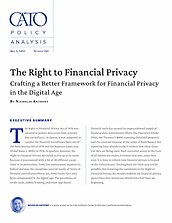Financial privacy in the United States has been in disrepair for more than 50 years, and it’s getting worse. Not only are decades-old beliefs (e.g., the third-party doctrine) highly questionable, but they are also particularly dangerous in the digital age. Efforts, both new and old, to surveil and collect data on Americans’ financial activity show that now is the time for Congress to craft a better framework for financial privacy. But Congress may not need to look far for ideas on how to protect Americans’ financial privacy.
The Right to Financial Privacy Act, originally enacted in 1978 in response to how the Bank Secrecy Act and the third-party doctrine weakened the protections of the Fourth Amendment to the U.S. Constitution, has already set a foundation for some of the protections needed today. However, it is largely due to a long list of exceptions in the Right to Financial Privacy Act that much of the financial surveillance over the past 50 years has been permitted to expand—hidden away from the public eye.






